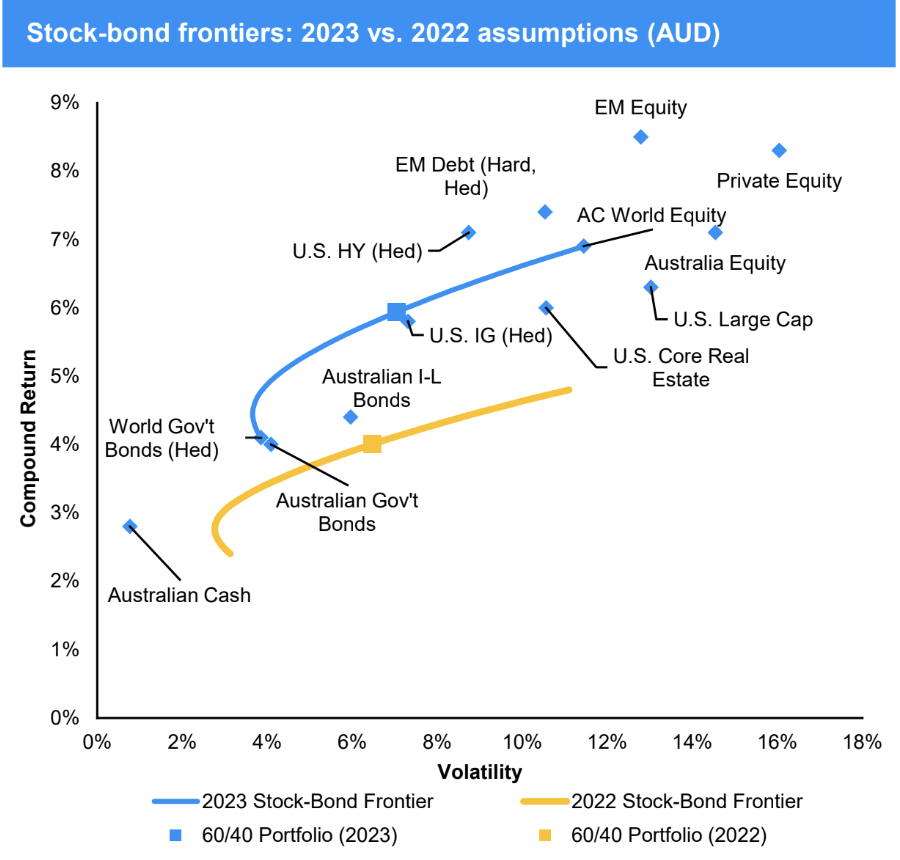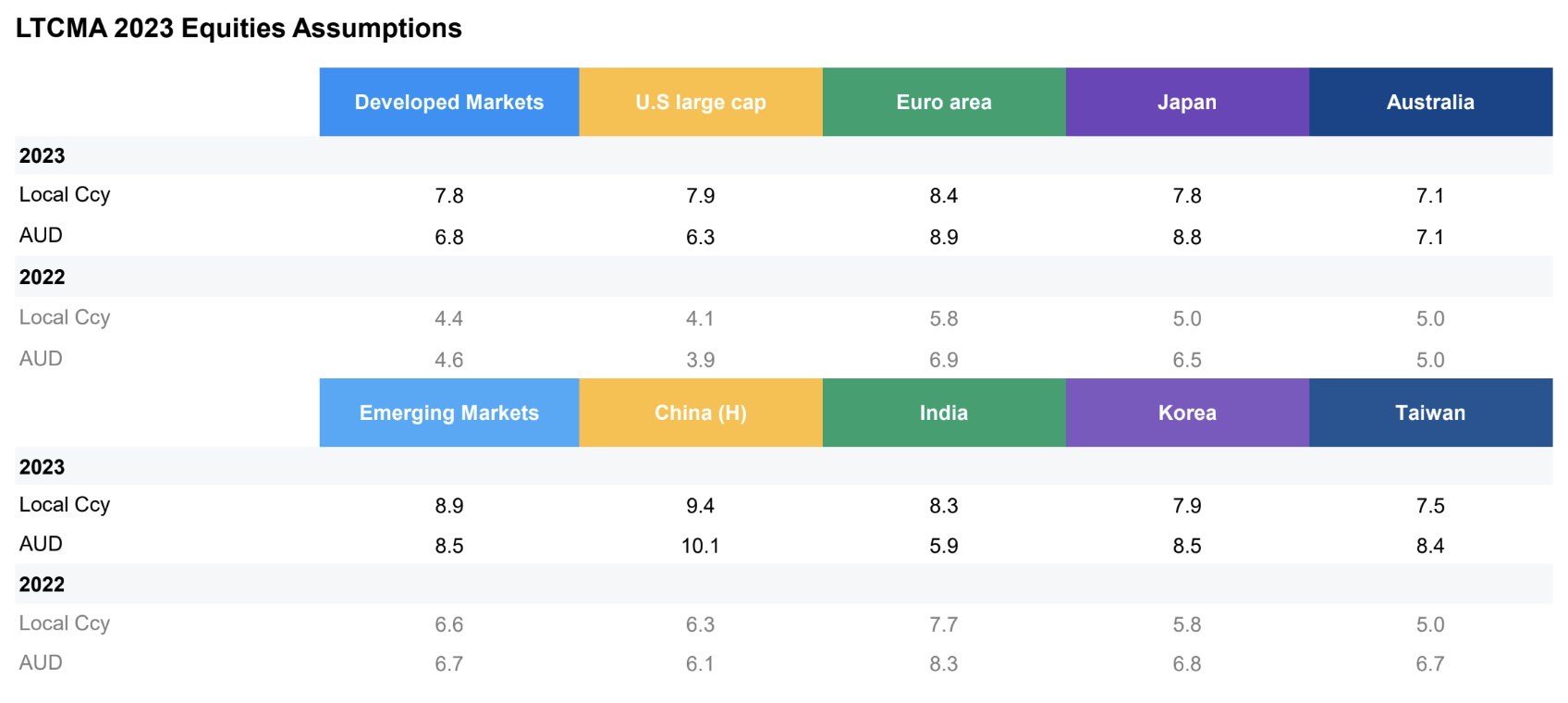Why 2023 could be the biggest buying opportunity since the GFC
After the year we've had in financial markets, it may seem dangerous to look out 10-15 years in advance. But J.P. Morgan Asset Management's global team believe 2023 will mark the start of a return to some kind of normality for markets.
They even believe 2023 will see the traditional 60/40 portfolio record its best year since 2010. In their view, average forecast returns for both equities and bonds will continue to climb even if a global recession hits.
"This is a pretty good starting point strategically for the next 10-15 years," analysts said with the preface that the traditional model portfolio is coming from a low base.
Recently, I sat down with Australia-based global markets strategist Kerry Craig and Hong Kong-based counterpart Leon Goldfeld to probe their thesis and find out where Australia stands against the competition going into 2023.
.png)
The million dollar chart
To explain how bullish the strategists are, it's helpful to start with this chart which showcases their assumptions for next year. As they explain it, the fundamentals in asset markets are "back at par", as long as inflation comes back down to target next year and those cyclical headwinds (supply chains, food prices, etc) become the tailwinds they could be.

As a guide, any 'diamond' north of the blue curve line (the stock-bond frontier) is considered an accumulation opportunity for investors with a long-term view. It also takes into account a key assumption - the global economy is not in a "new inflation regime" and central banks will not reset their inflation goals in spite of the experience investors have had this year.
"Central banks are willing to tolerate a recession in order to bring inflation down," Goldfeld said. "It's not just rhetoric, they have to back it up with action."
Equities are back and in a big way
Both developed and emerging market equities are tipped to rebound. Even the ASX 200, which has outperformed its developed market peers, is projected to return 7%+ per annum for the next 10-15 years.
Locally, Craig's preferred sectors for 2023 continue to include a lot of the defensive themes of 2022, including a preference for healthcare and banking stocks. In contrast, he is avoiding sectors related to the roll-off in consumer savings and the housing market's decline.
But even when I asked him for more detail on the Australian equity market, he continued to press the same point - offshore opportunities like emerging markets are far more appetising.
"When you look inside those emerging markets, there is a better valuation picture," he noted. "Margins are less of a drag for emerging markets."
As the below table shows, China is tipped to be the outperformer among all the major emerging markets as long as its productivity reforms continue as scheduled (starting of course with the end of its long-held zero-COVID policy).

Some of the sectors of most interest to Goldfeld and his team in the tiger economy include publicly listed state-owned enterprises (think of industrials and energy producers) as well as consumer stocks.
"China at the margin and on valuations looks attractive in the long term," Goldfeld added.
Bonds are no longer "serial losers"
And after a rough year for the global bond market, Australian fixed income may finally look attractive. It's so attractive that investing in bonds is their top conviction call. So why are they so bullish - and is it as simple as "it can't get any worse"?
"Bonds are back but they do come with some baggage because of the weaker correlation to equities," Craig said.
In their forecasts, Australian yields are tipped to return 4% per annum over the next decade. That figure is in line with the projected return on a US 10-year yield (i.e. the global benchmark) but well below the kind of returns you could get if you played in the high yield or investment grade market.
Incidentally, part of the reason Australian assets could perform better over the next decade is the team's forecast for the Australian dollar.
The US Dollar is projected to fall against its major trading partners significantly over the next decade. A lower US Dollar means (in theory) a higher Australian dollar, which increases the attractiveness for investors to take a look at owning Australian bonds.
Alternatives are here to stay
And after a bumper year in which alternatives became one of the few bright spots in a tough market, real assets still have the potential to outperform next year. But, as Craig and Goldfeld warn, the disparity between winners and losers will become much wider over time.
"The dispersion between top-and-bottom quartile manager performance remains wide and proper manager selection is crucial to realizing the full return potential," they wrote in their report.
The same could also be said for hedge funds. One area the team are particularly bullish on for the long term is the venture capital space, which they say could provide the greatest return across all private markets if executed well. Private equity will continue to perform well as an inflation hedge despite the impact rising interest rates will continue to have on the cost of capital.
"Real assets have that inflation hedge within them, so there is a case for picking up private markets," Craig added.
Never miss an insight
If you're not an existing Livewire subscriber you can sign up to get free access to investment ideas and strategies from Australia's leading investors.
I'll be in charge of asking the questions to Australia's best strategists, economists, and fixed-income fund managers. If you have questions of your own, flick us an email: content@livewiremarkets.com
3 topics
1 contributor mentioned

